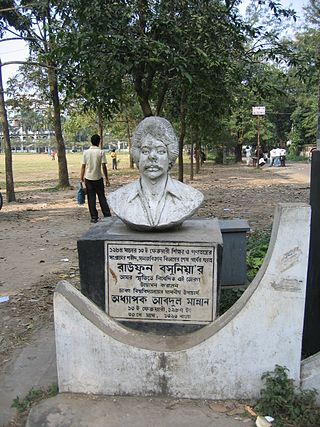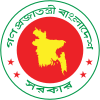
The Bangladesh Nationalist Party is a major political party in Bangladesh. It was founded on 1 September 1978 by the late Bangladeshi president Ziaur Rahman, after the presidential election of 1978, with a view of uniting people with a nationalist ideology. Following Rahman's assassination in 1981, his widow, Khaleda Zia, took over leadership of the party and presided as chairperson until her imprisonment, in 2018. Since then, Tarique Rahman, the son of Rahman and Zia, has served as acting chairperson and has run the affairs of the party from London.
The Islami Oikya Jote is a political party in Bangladesh and allied with the former Four Party Alliance.

Bangladesh Islami Chhatrashibir, is an Islamic student organization based in Bangladesh. It was established on 06 February 1977. The organisation is generally understood to be the student wing of Bangladesh Jamaat-e-Islami, and several of the leaders of the student organisation have gone on to become notable leaders within Jamaat. The organisation has a significant presence in higher educational institutions of the country such as University of Dhaka, University of Chittagong, Rajshahi University, SUST, BUET, DUET, Medical College. Recently however, the student Organisation has been under pressure from the Bangladesh government led by the ruling party Awami League and its student wing, the Bangladesh Chhatra League.

Eden Mohila College, is a women's college in Azimpur, Dhaka, Bangladesh. It was established in 1873 in the Farashganj area of Dhaka. In 1878 the school was named after Ashley Eden, Lieutenant Governor of Bengal. The college moved to its present premises in 1963. It is affiliated with the University of Dhaka as of 16 February 2017.

Dhaka University of Engineering & Technology, Gazipur or DUET is a public engineering and technological research university in Gazipur, Bangladesh, which focuses on the study of engineering and architecture. It is one of the nine PhD granting research universities of Bangladesh. The university requires diploma engineer candidates, graduated from polytechnic institutes or technical schools affiliated by the Bangladesh Technical Education Board for undergraduation enrollment.

The Bangladesh Chhatra League, formerly known as the East Pakistan Student League, often simply called the Chhatra League, is a students' political organisation in Bangladesh, founded by Sheikh Mujibur Rahman on 4 January 1948. BSL is the student wing of the Bangladesh Awami League.

Mawlana Bhashani Science and Technology University (MBSTU) is the 12th oldest public university and second science and technology specialized PhD granting public university in Bangladesh focusing in science, technology and business. It is named after the charismatic political leader Mawlana Abdul Hamid Khan Bhashani. The medium of instruction is English. Every year, in total 925 students are enrolled in undergraduate programs to study in this institution. The number of teachers is about 243. In 2021, MBSTU ranked as the top research university in Bangladesh by Scopus-SCImago institution ranking. In 2020, MBSTU was ranked first among all the universities of Bangladesh based on Scimago Institutions Rankings.

The Bangladesh Islami Front is a far-right Islamic political party in Bangladesh. In the 2001 parliamentary election, the party fielded 16 candidates. Together they gathered 29,002 votes, but the party won no seats in the Jatiya Sangsad. The party's student wing is Bangladesh Islami Chattra Sena.

Bangladesh Jamaat-e-Islami, previously known as Jamaat-e-Islami Bangladesh, or Jamaat for short, is the largest Islamist political party in Bangladesh. On 1 August 2013, the Bangladesh Supreme Court cancelled the registration of the Jamaat-e-Islami, ruling that the party is unfit to contest national elections.

Bangladesh Jatiotabadi Chatra Dal, also known as J.C.D, is the student wing of the Bangladesh Nationalist Party (BNP). Many of the top BNP leaders and policy-makers today were once closely associated with JCD and developed as student leaders.

On 5 February 2013, protests ignited in Shahbagh, Bangladesh, fueled by the call for the execution of the convicted war criminal and Islamist Abdul Quader Mollah. Previously sentenced to life imprisonment, Mollah was convicted on five of six counts of war crimes by the International Crimes Tribunal of Bangladesh. Mollah supported the West Pakistan during the 1971 Bangladesh Liberation War and played a crucial role in the murder of numerous Bengali nationalists and intellectuals. The demonstrations also sought the government's ban on the radical right-wing and conservative-Islamist group, Jamaat-e-Islami from participating in politics, including elections, and a boycott of institutions supporting or affiliated with the group.

On 28 February 2013, the International Crimes Tribunal sentenced Delwar Hossain Sayeedi, the vice-president of the Jamaat-e-Islami to death for war crimes committed during the 1971 Bangladesh Liberation War. Following the sentence, activists of Jamaat-e-Islami and its student wing Islami Chhatra Shibir attacked Hindus in different parts of the country. Hindu properties were looted, Hindu houses were burnt into ashes and Hindu temples were desecrated and set on fire. While the government has held the Jamaat-e-Islami responsible for the attacks on minorities, the Jamaat-e-Islami leadership has denied any involvement. Minority leaders have protested the attacks and appealed for justice. The Supreme Court of Bangladesh has directed law enforcement to start suo motu investigation into the attacks. The US Ambassador to Bangladesh expressed concern about attacks by Jamaat on the Bengali Hindu community.

Hefazat-e-Islam Bangladesh is a far-right conservative-islamic advocacy group consisted mostly of hard-line religious teachers and students. In 2013, they submitted a 13-point charter to the Government of Bangladesh, which included the demand for the enactment of a blasphemy law.
The 2013 Bangladesh Quota Reform Movement was a movement against incumbent government policies regarding jobs in the government sector in the country. The movement began in the same location that saw the 2013 Shahbag protests in Dhaka, Bangladesh. Although initially confined to the locality of Shahbag and Dhaka University campus, it eventually spread to other parts of Bangladesh. It attained popularity as students of different universities in various parts of the country brought out processions of their own while demonstrating in solidarity with the main protest movement and pressing forward with similar demands.

Islami Andolan Bangladesh, abbreviated as IAB, is an Islamist political party in Bangladesh. It was founded in 1987 by Fazlul Karim as Islami Shashontantra Andolan, and took its current name in 2008.

Raufun Basunia, former Joint Secretary of Bangladesh Chhatra League, and the General Secretary of its University of Dhaka branch was a prominent student leader who led anti-dictatorship movement in Bangladesh and was killed by pro-junta activists. He was shot dead during a clash between Chhatra Sangram Parishad and Chhatra Samaj, the ruling Jatiyo Party-backed student wing in front of Mohsin Hall at University of Dhaka on 13 February 1985. His death provoked the anti-junta student activists, and the movement for restoration of democracy became even more radicalised and consolidated. It became so violent that the dictator Hussein Muhammad Ershad had to resign shortly afterwards.

The 1990 Mass Uprising, popularly known as '90's Anti-Authoritarian Movement, was a democratic movement that took place on 4 December and led to the fall of General Hussain Muhammad Ershad in Bangladesh. The uprising was the result of a series of popular protests that started from 10 October 1990 to topple General Ershad who came to power in 1982 by imposing martial law and replaced a democratically elected President through a bloodless coup.
1999 JU Anti-Rape Movement is a series of student protests against the culture of rape and sexual harassment in the Jahangirnagar University of Bangladesh. The movement initiated in 1998 when Bangladesh Chhatra League activists celebrated the 100th rape of women by their leader Jasimuddin Manik, who was the General Secretary of Jahangirnagar University unit of Bangladesh Chhatra League. After a year-long protests dominated by female students, on August 2, 1999, Jasimuddin Manik and his armed cadres, accused of numerous rape and sexual harassments inside the campus were ousted from the university.
A series of rallies, demonstrations, and blockades opposing the visit of the Indian Prime Minister Narendra Modi were held in Bangladesh from 19 to 29 March, on the celebration of the birth centenary of Bangabandhu Sheikh Mujibur Rahman and the 50th anniversary of Bangladesh's independence from Pakistan. Accusing Narendra Modi of committing crimes against humanity during the 2002 Gujarat riots, the protesters agitated against what they alleged were India's anti-Muslim policies and India's interference in Bangladeshi politics. Protesters demanded the cancellation of the Bangladesh government's invitation to the Indian Prime Minister. The otherwise peaceful protests turned violent when the protesters were attacked by the supporters of the ruling Awami League party along with a crackdown by the law-enforcement agencies, causing the deaths of several protesters throughout the last week of March 2021 in Bangladesh. Initially launched by progressive student organizations including the Bangladesh Students Union, Bangladesh Sadharon Chhatra Odhikar Songrokkhon Parishad, and the Socialist Students' Front, the demonstrations were later joined by the Islamic group Hefazat-e-Islam Bangladesh.
The Bangladesh Chhatra League, formerly East Pakistan Student League, often simply called the Chhatra League, is a students' political organisation in Bangladesh, founded by Sheikh Mujibur Rahman on 4 January 1948. BSL is the student wing of the Bangladesh Awami League. It's played important role in the Bangladesh War of Independence but after 1972 it split into two factions on the basis of alliance to Shekh Mujibur Rahman. But later it has been repeatedly accused of using torture, extortion, violence, forced prostitution, and killings to instill fear. At least 33 people were killed and 1,500 got seriously injured from attacks by BSL between 2009 and 2014. Number of fatalities rose to 129 between 2014 and 2018 while 31 people were killed in 2018 alone.














